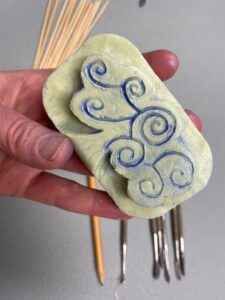Prescribe Culture: University of Edinburgh Museums

The project
Prescribe Culture began as a pilot in 2019 with two offers, Programme 6 and the Take 30 heritage site activity resource. Programme 6 was a series of 90 minute workshops. Every session began with an exploration of a heritage object, site or archive and finished with a creative hands-on activity. It is influenced by the social prescribing model, but with a focus on the potential of engagement with heritage to increase a sense of connection to the world around us, with increased social connection being a secondary outcome. The programme has its origins firmly rooted in supporting improvements in mental health for members of the student community referred to the programme.
The evaluation report evidenced the pilot to have been of benefit to the students. All stakeholders agreed the value in further developing Prescribe Culture and making it sustainable as a longer-term offer.
Following the success of the pilot the plan was to work on securing funding to make Programme 6 and the Take 30 resource embedded offers from the museum service. Then COVID-19 struck. In direct response to the increased sense of loneliness and isolation caused by the pandemic, as well as onset or exacerbation of pre-existing anxiety, a new online Prescribe Culture offer began in May 2020. Take 30 Together Virtual (T30TV) is available to adults across the community and is self-referral. It offers twice weekly opportunities to ‘escape, explore and e-socialise with heritage’. It currently has an intergenerational, international membership of 105.
"It gave me a calming activity, a much more productive and helpful way to distract myself and relax than I had before. It is a useful addition to other forms of support. It has limited the negative change. I think I would have been a fair bit worse without Prescribe Culture to look forward to each week."
Student Member feedback - Prescribe Culture Programme 6
Challenges and successes
- The primary challenge of improving the effectiveness of Prescribe Culture’s Programme 6 is finding a safe and responsible way for the referral partner to share student patient/client contact details to allow the Museums team to pro-actively ‘reach out’ and build a trusting relationship with the student.
- The key success of Programme 6 is that we’ve developed and evidenced a new option for our colleagues in the University’s Health, Counselling and Student Support team to ‘prescribe’ to appropriate students before, instead of or alongside medication, Cognitive Behavioural Therapy (CBT) or other referral paths.
- The primary challenges for Prescribe Culture’s T30TV programme are how do we support those in need when we have reached T30TV membership capacity and how do we maintain the supply of T30TV Guest Guides, as heritage professionals return to on-site activities?
The impact it has made
Evaluation and feedback on Programme 6 and the T30TV programme highlight that 100% of members agree that participation has supported their sense of connection to the world around them. They would recommend it to others seeking support for mental wellbeing and they have felt a sense of personal growth.
- The UoE Museums Manager/Prescribe Culture Lead is currently mentoring Health and Museums staff in two Universities in Canada and in two Universities in England to support their development of a Prescribe Culture model and has recently co-authored a course for Queen’s University, Canada, entitled ‘The Science of Well-being, Mental Health and Resiliency’.
- Under the Prescribe Culture banner, the UoE Museums are about to appoint a Community Connector to support ‘At Home with Heritage’, a project funded by MGS COVID-19 Museum Development grant, to support those living with health and social inequalities for whom digital is not a solution to accessing the benefits of heritage engagement.
Lessons learned
Heritage has something different to offer from the arts, nature and exercise. This is not about competition, it is about developing choice for the individual.
- Arts and sports colleagues have worked hard to evidence and communicate the benefits of their work for wellbeing and mental ill health intervention. Currently heritage benefits are not as well or widely recognised.
- The heritage sector is extremely ready and willing to support the wellbeing and mental health of their local community and, indeed, those across the world, through digital engagement.
Guidance
- Don’t go it alone, you will not have all the answers – find your perfect partner and be stronger together! Get to know your most local Social Prescriber or Link Worker.
- Be clear! Understand the difference between a wellbeing support programme and a mental health support programme.
- Don’t second guess! There is a feast of training courses and excellent books out there. Ensure you undertake training to ensure best practice for developing and delivering wellbeing programmes and/or mental health support projects.
Further information
For anyone who is considering starting or further developing heritage for mental health and wellbeing contact Ruthanne Baxter, UoE Museums Manager and Prescribe Culture Founder: Ruthanne.Baxter@ed.ac.uk